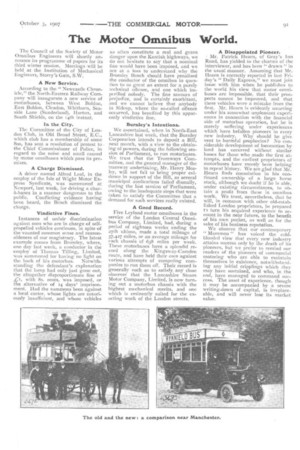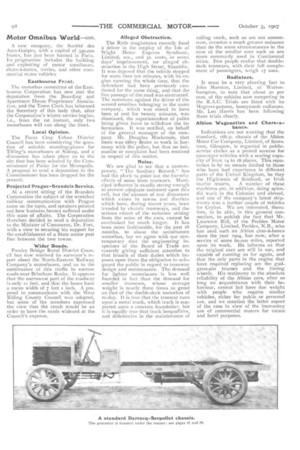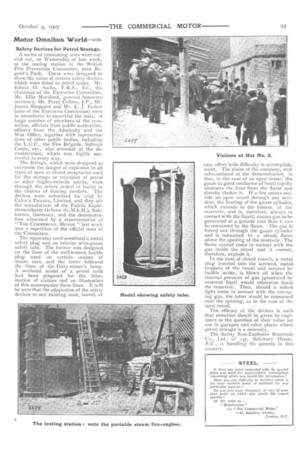The Motor Omnibus World.
Page 7

Page 8

Page 9

If you've noticed an error in this article please click here to report it so we can fix it.
The Council of the Society of Motor Omnibus Engineers will shortly announce its programme of papers for its third winter session. Meetings will be held at the Institution of Mechanical Engineers, Storey's Gate, S.W.
A New Service.
According to the " Newcastle Chronicle," the North-Eastern Railway Company will inaugurate a new service of motorbuses, between West Boldon, East Boldon, Cleadon, Whitburn, Seaside Lane (Sunderland), Harton, and South Shields, on the 14th instant.
In the City.
The Committee of the City of London Club, in Old Broad Street, .E.C., which club has a membership of some Soo, has sent a resolution of protest to . the Chief Commissioner of Police, in regard to the noise and smell caused by motor omnibuses which pass its premises.
A Charge Dismissed.
A driver named Alfred Leal, in the employ of the Isle of Wight Motor Express Syndicate, was summoned at Newport, last week, for driving a char6-bancs in a manner dangerous to the public. Conflicting evidence having been heard, the Bench dismissed the charge.
Vindictive Fines.
Instances of unfair discrimination against men who are in charge of selfpropelled vehicles continues, in spite of the vaunted common sense and reasonableness of our magistracy. The latest example comes from Bromley, where, one day last week, a conductor in the employ of Thomas Tilling, Limited, was summoned for having no light on
the back of his motorbus. Notwithstanding the defendant's explanation that the lamp had only just gone out, the altogether disproportionate fine of Li, with 8s. costs, was imposed, or the alternative of 14 days' imprisonment. Had the summons been against a local carter, whose lights are notoriously insufficient, and whose vehicles
so often constitute a real and grave danger upon the Kentish highways, we do not hesitate to say that a nor':final fine would have been imposed, and we are at a loss to understand . why the Bromley Bench should have penalised the conductor of the omnibus in question to so great an extent for.a purely technical offence, and one which imperilled nobody. The fine savours of prejudice, and is certainly exorbitant, and we cannot believe that anybody in Sidcup, where the so-called offence occurred, has benefited by this apparently vindictive fine.
Burnley's Intentions.
We ascertained, when in North-East Lancashire last week, that the Burnley Corporation intends to deposit a Bill, next month, with a view to the obtaining of powers, during the following session of Parliament, to run motorbuses. We trust that the Tramways Committee, and the general manager of the tramway undertaking, Mr. Henry Mozley, will not fail to bring proper evidence in support of the Bill, as several municipal apolications failed dismally, during the last session of Parliament, owing to the inadequate steps that were taken to satisfy the Committee that a demand for such services really existed.
A Good Record.
Five Leyland motor omnibuses in the service of the London Central Omnibus Company, Limited, had, during a period of eighteen weeks ending the 27th ultimo, made a total mileage of 57,427 miles, or an average mileage for each chassis of 638 miles per week. These motorbuses have a splendid record along the Kingsway-Camden route, and have held their own against various attempts of competing companies to run them off. Their record is generally such as to satisfy any close observer that the Lancashire Steam Motor Company, Limited, is now turning out a motorbus chassis with the highest mechanical merits, and one which is eminently suited for the exacting work of the London streets.
A Disappointed Pioneer. • Mr. Patrick Hearn, of Gray's Inn Road, has yielded to the charms of. the interviewer, and has been "drawn " in the usual manner. Assuming that Mr. Hearn is correctly reported in last Friday's " Daily Express," we must join issue with him when he publishes to the world his view that motor omnibuses are impossible, that their prospects cannot be improved, and that these vehicles were a mistake from the first.. Mr. Hearn is evidently smarting under his somewhat unpleasant experiences in connection with the financial side of motorbus operation, but he is merely suffering under experiences which have befallen pioneers in every new industry. Why should he give vent to harmful pnophecies? No considerable development of locomotion by land has occurred without similar losses for those who made the first attempts, and the earliest proprietors of motorbuses have merely been helping to repeat history. We are glad that Mr. Hearn finds consolation in his continued ownership of a large horse stock, although we doubt if he is able, under existing circumstances, to obtain a profit from these in omnibus work. We trust, nevertheless, that he will, in common with other old-established London proprietors, be prepared b turn his acquired experience to account in the near future, to the benefit of his own pocket, as well as for the sake of his business reputation. We observe that our contemporary " Mammon " has voiced the coldblooded view that every new industry attains success only by the death of its pioneers, but we prefer to remind our readers of the pioneers of commercial motoring who are able to maintain themselves in existence, notwithstanding any initial crippiings which they may have sustained, and who, in the end, have managed to command success. The asset of experience, though it may be accompanied by a severe writing-down of capita!, is irreplaceable, and will never lose its market value.
A new company, the Soc.iet6 des Auto-GuiTes, with a capital of 350,000 francs, has just been formed in Paris. Its programme includes the building and exploiting of motor omnibuses, chars-a-bancs, lorries, and other commercial motor vehicles
Eastbourne Frznt.
The motorbus committee of the Eastbourne Corporation has now met the deputation from the Boarding and Apartment House Proprietors' Association, and the Town Clerk has informed the Secretary of this body that, after the Corporation's winter service begins, i.e., from the 1st instant, only two motorbuses will run along the front.
Local Opinion.
The Foots Cray Urban District Council has been considering the question of suitable standing-places for Tilling's motorbuses at Sidcup, and a discussion has taken place as to the site that has been selected by the Cornmissioner of Police for the Metropolis. A proposal to send a deputation to the Commissioner has been dropped for the present.
Projected Prague-Brandeis Service,
At a recent sitting of the Brandeis Corporation the subject of the wretched railway communication with Prague came on the tapis, and speakers pointed out how business houses suffered under this state of affairs. The Corporation therefore decided to send a deputation to the Minister of Commerce, Dr. Fort, with a view to securing his support for the establishment of a State motor post line between the two towns.
Wider Roads.
Pateley Bridge Rural District Council has now received its surveyor's report about the North-Eastern Railway Company's motorbuses, and as to the continuance of this traffic in narrow roads near Brimham Rocks. It appears that the narrowest part of the roadway is only II feet, and that the buses have a mean width of 7 feet I inch. A proposal to communicate with the West Riding County Council was adopted, but some of the members expressed the view that the result would be an order to have the roads widened at the Council's expense.
Alleged Obstruction.
The Ryde magistrates recently fined a driver in the employ of the Isle of Wight Motor Expiess Syndicate, Limited, ins., and 35, costs, or SeV€11 days' hnprisonment, tor alleged obstruction in the High Street, Shanklin. It was deposed that the vehicle stopped for more than ten minutes, with its engine running the whole time, that the defendant had been previously cautioned for the same thing, and that the free passage of the road was obstructed. The summons against the driver of the second omnibus belonging to the same company, which was stated to have been at rest for twenty minutes, was dismissed, the superintendent of police being given leave to withdraw the information. It was notified, on behalf of the general manager of the company Mr. Douglas Mackenzie, that there was every desire to work in harmony with the police, but that no intimation or complaint had been received in respect of this matter.
Noise.
We are glad to see that a contemporary, " The Sanitary Record,' has had the pluck to point out the harmful effects of noise from tramcars. Municipal influence is usually strong enough 1-.0 prevent adecfuate comment upon this evil, but the amount of real disoontent which exists in towns and districts which have, during recent years, been invaded ky electric tramways, and the serious extent of the nuisance arising from the noise of the cars, cannot be overlooked for much longer. It has been more fashionable, for the past 18 months, to abuse the unfortunate motorbus, but we agree with our contemporary that the engineering inspectors of the Board of Trade are scarcely giving sufficient attention to that branch of their duties which imposes upon them the obligation to safeguard the public in regard to tramway design and maintenance. The demand for lighter motorbuses is less well founded in fact than the demand for smaller tramcars, whose average weight is nearly three times as great as that of the double-deck motorbus of to-day. It is true that the tramcar runs upon a metal track, Which track is supported upon a concrete foundation, but it is equally true that track inequalities, and deficiencies in the maintenance. of
rolling stock, such as are not unoommon, occasion a much greater nuisance than do the same circumstances in the case of the smaller cars such as are more commonly used in Continental cities. Few people realise that double.. decktramcars, with their full complement of passengers, weigh 17 tons_
Radiators.
It must be a very pleasing fact to John Marston, Limited, of Wolverhampton, to note that about 20 per cent. of the vehicles now competing in the R.A.C. Trials are fitted with its Megevet-pairern, honeycomb radiators. Mr, Leo Harris has been following these trials closely.
Albion Wagonettes and Chars-abanes.
Indications are not wanting that the standard, 16h.p. chassis of the Albion Motor Car Company, Limited, of Scottoun, Glasgow, is regarded in publicservice circles as a proved suocess for passenger vehicles with a seating capacity of from 14 to 18 places. This reputation is by no means limited to those who have had experience in different parts of the United Kingdom, be they the Highlands of Scotland, or Irish tourist resorts. A number of these machines are, in addition, doing splendid work in the Colonies and abroad, and one of the company's latest shipments was a further couple of vehicles for Ceylon. We are interested, therefore, to be able, in this general connection,. to publish the fact that Mr. Laurence Bell, of the Peebles Motor Company, Limited, Peebles, N.B., who has used such an Albion char-a-banes since the year 1904, has now, after a service of some 6o,000 miles, reported upon its work. He informs us that the original cars are still in use, and capable of running as far again, and that the only parts in the engine that have required replacing are the gudgeon-pin brasses and the timing wheels. His testimony to the absolute reliability of the Albion cars, after so long an acquaintance with their behaviour, cannot but have due weight with people who require similar vehicles, either for public or personal use, and we mention the latter aspect of the case in view of the increasing use of commercial motors for estate and hotel purposes.
Safety Devices for Petrol Storage.
A series of interesting tests were carried out, on Wednesday of last week, at the testing station of the British Fire Prevention Conunittee, near Regent's Park. These were designed to show the value of certain safety devices which were fitted to petrol tanks. Mr. Edwin 0, Sachs, F.R.S., Ed., the chairman of the Executive Committee, Mr. Ellis Marsland, general honorary secretary, Mr. Percy Collins, J.P., Mr. James Sheppard and Mr. E. J. Fulkes (also of the Executive Committee) were in attendance to supervise the tests. A large number of members of the committee, officials from public authorities, officers from the Admiralty and the War Office, together with representatives of other public bodies, including the L.C.C., the Fire Brigade, Salvage Corps, etc., also attended at the demonstration, w-hrich was highly successful in every way.
The fittings, which were designed to overcome the danger of explosion in all types of open or closed receptacles used for the storage or transport of petrol or other highly-volatile spirits, went through the severe ordeal of burial in the centres of blazing bonfires. The devices were submitted for trial by Cairn's Patents, Limited, and they are the manufacture of the Fabrik Explosionssicherer Gefasse (G.M.b.H.), Salzkotten, Germany, and the demonstration witnessed by a representative of "THE COMMERCIAL. Moron" last week was a repetition of the official tests of the Committee.
The apparatus used combined a metal safety plug and an interior wire-gauze safety tube. The former was designed on the lines of the well-known fusible plug used on certain makes of steam cars, and the latter followed the lines of the Davy miner's lamp. A sectional model of a petrol tank had been prepared for the information of visitors and an illustration of this accompanies these lines. It will be seen that the adaptation of the safety devices to any existing tank, barrel, or
can, offers little difficulty in accomplish-. ment. The claim of the company, well substantiated at the demonstration, is that, in the case of an open vessel, the gauze (a good conductor of heat) rapidly abstracts the heat from the flame and. thereby chokes it. H a fire occurs outside an open vessel through any accident, the heating of the gauze cylinder,, which extends to the bottom of the reservoir, and is, therefore, always in, contact with the liquid, causes gas to be generated at a greater rate than it can be consumed by the flame. The gas is forced out through the gauze cylinder and is consumed by a steady flame. above the opening of the reservoir. The flame cannot come in contact with the gas inside the vessel and it cannot,. therefore, explode it.
In the case of closed vessels, a metal plug inserted into the screwed, meta stoppers of the vessel and secured by fusible solder, is blown off when theinternal pressure of gas (generated by external heat) would otherwise burst the reservoir. Then, should -a naked light come in contact with the emerging gas, the latter would be consumed' over the opening, as in the case of the open vessel.
The efficacy of the devices is such that attention should be given by engineers to the question of their value for use in garages and other places where. petrol storage is a necessity.
The Safety Non-Explosive Reservoir Co., Ltd., of 137, Salisbury House, E.C., is handling the patents in this country.




























